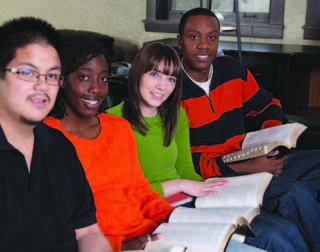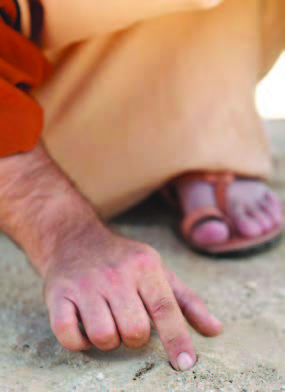As most of us know, God is now building a “family.” He is our Father, and we are all “brothers and sisters.” Under the direct supervision of the Father and of Christ—our loving Head—the true Church is like our “Jerusalem”-—the “mother of us all” (Galatians 4:26). For the Church helps us understand and put into action many aspects of Christian living. It corrects us, guides us and encourages us in many ways.
Through our loving cooperation in the true Church of God, the very Work of God is carried out. Through the Church, we have the opportunity to experience and to picture the kind of interaction, service and loving fellowship which will be finally perfected when we are “born of God” at the resurrection from the dead (Romans 1:4). Together—if we are truly overcomers—we will become those kings and priests who will assist Christ in ruling this entire world within the next few decades (Revelation 1:6; 5:10).
When Jesus was informed that “Your mother and Your brothers” were outside seeking Him, He replied, “‘Who is My mother, or My brothers?’ And He looked around in a circle at those who sat about Him, and said, ‘Here are My mother and My brothers! For whoever does the will of God is My brother and My sister and mother’” (Mark 3:33–35). In this and many other statements, Jesus Christ clearly indicated that His true disciples were to have a “family-type” relationship with Him and with each other. So, we should develop the loving relationship and the genuine trust that close members of a good family should have. Jesus said, “Moreover if your brother sins against you, go and tell him his fault between you and him alone. If he hears you, you have gained your brother” (Matthew 18:15).
Brethren, we in God’s Church today need to build that kind of loving concern and trust. We all need to meditate on the fact that we will spend all eternity with our brothers and sisters in God’s Church. So, it is absolutely vital that we now—in this life—learn to lovingly and patiently interact with one another in preparation for eternal life together in God’s Kingdom. It will be helpful if each one of us learns to “picture” ourselves—so to speak—helping, serving and interacting with all our Church brethren throughout the next ten trillion years!
After telling His disciples to “go to your brother” in the passage I just cited in Matthew 18:15, it is interesting that the next thing Christ guided Matthew to write was the following: “Then Peter came to Him and said, ‘Lord, how often shall my brother sin against me, and I forgive him? Up to seven times?’ Jesus said to him, ‘I do not say to you, up to seven times, but up to seventy times seven’” (vv. 21–22).
Jesus was clearly showing in this passage that the family relationship and willingness to correct each other described in the previous verses would involve real forgiveness on the part of each one of us. For we simply must learn to genuinely forgive one another—over and over—or we will just not make it into the loving Kingdom of God that will soon be set up on this earth! Right after revealing what we call the “model prayer,” Jesus declared: “For if you forgive men their trespasses, your heavenly Father will also forgive you. But if you do not forgive men their trespasses, neither will your Father forgive your trespasses” (Matthew 6:14–15). Of course, the genuine forgiveness that we must learn to give each other is all based upon each one of us developing the sincere love that comes from God alone. This love will enable us to develop forgiving attitudes, and it will help us all to truly appreciate and enjoy the loving relationship we can have with others in the begotten Family of God even today. It is all based upon our willingness to let Christ fully live His life within us (Galatians 2:20). It is based upon our full and continuing realization that every one of us—black and white, male and female, old and young—is made fully in the “image of God” and deeply deserves profound love and respect as a potential son of God!
If we deeply believe this, practice this attitude, and pray about it on a continual basis, we will learn to exude the kind of warmth and love that God’s begotten Family should demonstrate. Then, we will definitely experience a profound loving relationship—throughout all eternity—that will far surpass anything we have been able to experience in this physical life. For, at that time, we will have totally overcome our human nature and be “filled with all the fullness” of God Himself through the rest of eternity (Ephesians 3:19).
Build a “Family” Spirit
Jesus Christ promised His disciples: “Assuredly, I say to you, there is no one who has left house or brothers or sisters or father or mother or wife or children or lands, for My sake and the gospel’s, who shall not receive a hundredfold now in this time—houses and brothers and sisters and mothers and children and lands, with persecutions—and in the age to come, eternal life” (Mark 10:29–30).
During my 64 years in the Church of God, I can honestly say that I have personally experienced the love and concern of hundreds of fathers and mothers and brothers and sisters that Jesus spoke of. For I can deeply remember—and fondly recall—the many dozens of brethren and fellow ministers who have helped me in so many ways over the decades. One of my earliest American Thanksgiving celebrations after I was baptized occurred when Mr. and Mrs. Herbert Armstrong themselves asked me (and a few other students) over to their home for the traditional Thanksgiving meal. I had already been pretty well acquainted with them through my friendship with Richard David Armstrong, their older son. But I had not yet had an actual meal in their home until that time. So it was a wonderful experience to feel the relaxed love and warmth and concern of Mr. and Mrs. Armstrong over several hours in their own home.
The Armstrongs’ kindness made the feeling of “lonesomeness” that I might otherwise have felt go away. For, back home in Missouri, we had always experienced a wonderful Thanksgiving meal with my father and mother and family and Uncle Paul and Aunt Ethel—Dr. and Mrs. C. Paul Meredith—and others. But now, I was with Mr. and Mrs. Armstrong, Dick Armstrong and a number of other students. Slowly but surely, the “spirit of family” was being experienced as I drew closer and closer to my fellow students and to many of the older brethren in God’s Church at Pasadena in those early days.
After my first year in Ambassador College, two students and I drove up to Oregon to “work in the woods,” as lumberjacks. Before we were able to get this job, one of the oldest couples in the Church—Mr. and Mrs. David Henion—had us live with them in their home. In a sense, it was amazing! For Mrs. Henion immediately “adopted” us as though we were her sons—cooked for us, washed our clothes, let us have the run of the house and treated us as sons in almost every possible way. Mr. Henion was also very solicitous of our welfare, and gave us advice and encouragement like a father. Dozens of times since then, I have experienced that kind of relationship with brethren in God’s Church—my many hundreds of brothers and sisters!
This is not “big news,” I know, to many of you. Some of you have also experienced this kind of relationship. But it is good that we think about it, learn to practice it even more deeply today, and realize what this means and the lessons we should be learning through the genuine giving and helping, serving and loving relationships we should be experiencing in the begotten “Family” of God!
As I have relayed to you in sermons, one of the early deaconesses, Mrs. Chloe Schnippert, constantly helped me like a mother when I was first learning to be a minister up in Portland, Oregon in the winter of 1952–53. She was actually a few years older than my real mother. But she wrote me notes of encouragement. She treated me like a son in every way she could. She and her husband had me to their home for dinner occasionally.
Mrs. Schnippert realized that, as a bachelor, I was probably not too good at housekeeping, so on a couple of occasions she even offered to come over and clean up my apartment. I dissuaded her by telling her that while I appreciated her offer, there was “no need.” Yet she knew I did not really know what I was talking about—though I did not realize it, my apartment did need to be cleaned! Not long after I turned down her kind offer for a second or third time, she simply came over one day with another lady in the Church. Brooms, dustpans, mop and bucket in hand! The two ladies invited themselves in, and began to clean my apartment in a way it had never been cleaned in the months that I had been there!
After these dear ladies left, I realized that it really did look somewhat “different.” I simply had not bothered to notice the little lines of dust and other things that had accumulated during the months that I was there. So, indeed, Chloe Schnippert was a “mother” to me in many ways—even writing me notes of encouragement almost every week for the “wonderful” sermon I had given on the previous Sabbath. Although I was perceptive enough to realize that my sermon was probably not all that great, this dear lady was trying to “mother” me and encourage me. And I appreciated it very much, nevertheless!
Many “Mothers,” Brothers and Sisters
Over the years, another one of the earliest Christian ladies to support Mr. Armstrong’s ministry—Mrs. Roy Hammer, whom many of you older brethren will remember—was constantly helping brethren in the Church. Along with her husband—and even more than her husband, since he had his regular job—she was at the “command post” on her telephone helping literally scores of brethren organize themselves and know what to do and where to stay when they came to the Feast of Tabernacles at Big Sandy when it was first being set up. She would help arrange a place to stay, tell them where they ought to shop and help personally with many situations. Also, when Mr. Raymond McNair and I (and later his younger brother Burk) came through there—she would always invite us to stay at their home and insist on washing our clothes. “You boys don’t know how to wash your own clothes properly, do you?” she would say, mothering us in every way she could. Looking back, I deeply appreciate the service of Mr. and Mrs. Hammer over the decades, and how she “mothered us” in a number of ways—just like a genuine mother would have done, and sometimes even more so!
In the early days of the Church in Pasadena, scores of the older brethren would invite people over for dinner or a visit and try to serve them and encourage them in every way they could. There was, indeed, a genuine “family spirit” in the Church in many of those years. As the Church grew bigger, more formal and more structured, some of that “family” spirit began to fade. Mr. Armstrong was off around the world on trips to visit world leaders, and some of the newer and younger ministers came along without the sense of kindliness that had been shown in earlier years. Yet, even then, the Church of God experienced a “family spirit” much more than most churches in the world ever do!
Some of our men in the Church—back then and now—regularly go out to help older people “fix up” their homes, mow their lawns and help them with many situations just as though they were part of the “family.” Many of our people give of themselves in helping those in need, in helping newer people get adjusted, find a job, have a place to stay, and so on. This is all part of what Christ wants us to do as part of the genuine “family” of God.
Jesus said: “A new commandment I give to you, that you love one another; as I have loved you, that you also love one another. By this all will know that you are My disciples, if you have love for one another” (John 13:34–35). Brethren, can newcomers or “outsiders” come to “see” that we in the Living Church of God are practicing this kind of love for one another? We must examine ourselves, individually, then try to do better. We must get down on our knees and beseech God, through Christ, to give us this kind of outflowing love and concern so that all will know that we are, indeed, the disciples of Christ! The Apostle Paul was inspired to tell the Corinthian brethren, “Now you are the body of Christ, and members individually” (1 Corinthians 12:27). For he had just stated earlier, “But God composed the body, having given greater honor to that part which lacks it, that there should be no schism in the body, but that the members should have the same care for one another. And if one member suffers, all the members suffer with it; or if one member is honored, all the members rejoice with it” (1 Corinthians 12:24–26).
Each one of us, therefore, needs to have the feeling that we want to “honor” those who are blessed—and rejoice with them. Each one of us needs to experience the suffering of others in the Church—as though they are members of our own body! For they are!
May God help all of us to “drink in” of this attitude and try to express it in many ways as we genuinely learn to love one another, serve one another and “give” to one another in a hundred different ways as we come to fully experience the “family” spirit which ought to shine forth in the Church of God. For our Church family is something that will give us friends and relatives far beyond what we have ever had before. When we fully practice this family spirit and it begins to radiate throughout God’s Church, this will profoundly help prepare all of us to be part of God’s Family for all eternity.